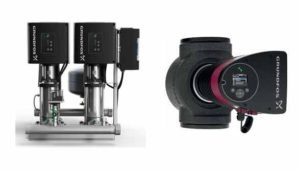 In an industrial setting pumps never work in isolation and are always a part of a larger system. Grundfos has invested heavily in the R&D of its products. It was 7 decades ago when they came up with their first pump, solely built for the purpose of moving liquid from point A to point B. Further developing on the technology, they introduced the E-Solution pumps, whose integrated controls enabled the pumps to adapt to changing demands. This helped further smoothen the pumps and make them more energy efficient.
In an industrial setting pumps never work in isolation and are always a part of a larger system. Grundfos has invested heavily in the R&D of its products. It was 7 decades ago when they came up with their first pump, solely built for the purpose of moving liquid from point A to point B. Further developing on the technology, they introduced the E-Solution pumps, whose integrated controls enabled the pumps to adapt to changing demands. This helped further smoothen the pumps and make them more energy efficient.
Fast forward to 2007, Grundfos pumps were the first company to couple IOT technology with their pumps, leading to what is now called – Grundfos iSolutions. Years of R&D and expertise in the pump industry, the iSolution greatly improved on several aspects. Focusing on intelligent communication between components like the drives, measurement & control systems, the Grundfos iSolution pumps have enabled the end-users to enjoy benefits like user-friendliness, great savings, and extended customization. It is the constant innovation by companies such as these that drive the move towards smarter factories.

Another aspect of smart factories is about how clean they are in terms of energy efficiency and anti-pollution measures. At this point in time, the capability of an industry to balance its environmental and business interests is crucial. A green factory not only entails a sustainable way of production, but it starts at how the facility is built (i.e.) the materials used. Also, it must take into account the energy consumed by the secondary processes of the factory. For example, temperature control is an important system in a factory, but that does require the temperature control system to function round the clock, as the load varies at different times. Using an intelligent solution like the Grundfos iSolution Temperature Control system ensures full control of temperatures with fewer components and a complete overview of the system’s performance.


